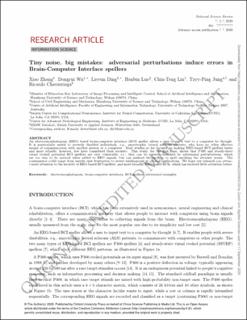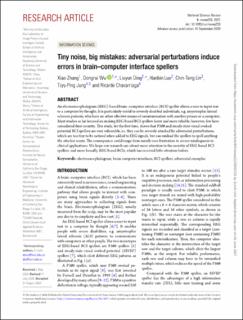Please use this identifier to cite or link to this item:
https://doi.org/10.21256/zhaw-20507Full metadata record
| DC Field | Value | Language |
|---|---|---|
| dc.contributor.author | Zhang, Xiao | - |
| dc.contributor.author | Wu, Dongrui | - |
| dc.contributor.author | Ding, Lieyun | - |
| dc.contributor.author | Luo, Hanbin | - |
| dc.contributor.author | Lin, Chin-Teng | - |
| dc.contributor.author | Jung, Tzyy-Ping | - |
| dc.contributor.author | Chavarriaga, Ricardo | - |
| dc.date.accessioned | 2020-09-17T13:06:45Z | - |
| dc.date.available | 2020-09-17T13:06:45Z | - |
| dc.date.issued | 2020-01-30 | - |
| dc.identifier.issn | 2095-5138 | de_CH |
| dc.identifier.issn | 2053-714X | de_CH |
| dc.identifier.uri | https://digitalcollection.zhaw.ch/handle/11475/20507 | - |
| dc.description.abstract | An electroencephalogram (EEG) based brain-computer interface (BCI) speller allows a user to input text to a computer by thought. It is particularly useful to severely disabled individuals, e.g., amyotrophic lateral sclerosis patients, who have no other effective means of communication with another person or a computer. Most studies so far focused on making EEG-based BCI spellers faster and more reliable; however, few have considered their security. This study, for the first time, shows that P300 and steady-state visual evoked potential BCI spellers are very vulnerable, i.e., they can be severely attacked by adversarial perturbations, which are too tiny to be noticed when added to EEG signals, but can mislead the spellers to spell anything the attacker wants. The consequence could range from merely user frustration to severe misdiagnosis in clinical applications. We hope our research can attract more attention to the security of EEG-based BCI spellers, and more broadly, EEG-based BCIs, which has received little attention before. | de_CH |
| dc.language.iso | en | de_CH |
| dc.publisher | Oxford University Press | de_CH |
| dc.relation.ispartof | National Science Review | de_CH |
| dc.rights | http://creativecommons.org/licenses/by/4.0/ | de_CH |
| dc.subject | Human-Computer Interaction | de_CH |
| dc.subject | Computer Science | de_CH |
| dc.subject | Learning | de_CH |
| dc.subject.ddc | 004: Informatik | de_CH |
| dc.title | Tiny noise, big mistakes : adversarial perturbations induce errors in brain-computer interface spellers | de_CH |
| dc.type | Beitrag in wissenschaftlicher Zeitschrift | de_CH |
| dcterms.type | Text | de_CH |
| zhaw.departement | School of Engineering | de_CH |
| zhaw.organisationalunit | Institut für Informatik (InIT) | de_CH |
| dc.identifier.doi | 10.1093/nsr/nwaa233 | de_CH |
| dc.identifier.doi | 10.21256/zhaw-20507 | - |
| zhaw.funding.eu | No | de_CH |
| zhaw.originated.zhaw | Yes | de_CH |
| zhaw.publication.status | publishedVersion | de_CH |
| zhaw.publication.review | Peer review (Publikation) | de_CH |
| zhaw.webfeed | Datalab | de_CH |
| zhaw.webfeed | Machine Perception and Cognition | de_CH |
| zhaw.author.additional | No | de_CH |
| zhaw.display.portrait | Yes | de_CH |
| Appears in collections: | Publikationen School of Engineering | |
Files in This Item:
| File | Description | Size | Format | |
|---|---|---|---|---|
| 2020_Zhang_Tiny_noise_big_mistakes_National_Science_Review.pdf | Accepted Version | 4.45 MB | Adobe PDF |  View/Open |
| 2021_Zhang-etal_Tiny-noise-big-mistakes.pdf | 1.81 MB | Adobe PDF |  View/Open |
Show simple item record
Zhang, X., Wu, D., Ding, L., Luo, H., Lin, C.-T., Jung, T.-P., & Chavarriaga, R. (2020). Tiny noise, big mistakes : adversarial perturbations induce errors in brain-computer interface spellers. National Science Review. https://doi.org/10.1093/nsr/nwaa233
Zhang, X. et al. (2020) ‘Tiny noise, big mistakes : adversarial perturbations induce errors in brain-computer interface spellers’, National Science Review [Preprint]. Available at: https://doi.org/10.1093/nsr/nwaa233.
X. Zhang et al., “Tiny noise, big mistakes : adversarial perturbations induce errors in brain-computer interface spellers,” National Science Review, Jan. 2020, doi: 10.1093/nsr/nwaa233.
ZHANG, Xiao, Dongrui WU, Lieyun DING, Hanbin LUO, Chin-Teng LIN, Tzyy-Ping JUNG und Ricardo CHAVARRIAGA, 2020. Tiny noise, big mistakes : adversarial perturbations induce errors in brain-computer interface spellers. National Science Review. 30 Januar 2020. DOI 10.1093/nsr/nwaa233
Zhang, Xiao, Dongrui Wu, Lieyun Ding, Hanbin Luo, Chin-Teng Lin, Tzyy-Ping Jung, and Ricardo Chavarriaga. 2020. “Tiny Noise, Big Mistakes : Adversarial Perturbations Induce Errors in Brain-Computer Interface Spellers.” National Science Review, January. https://doi.org/10.1093/nsr/nwaa233.
Zhang, Xiao, et al. “Tiny Noise, Big Mistakes : Adversarial Perturbations Induce Errors in Brain-Computer Interface Spellers.” National Science Review, Jan. 2020, https://doi.org/10.1093/nsr/nwaa233.
Items in DSpace are protected by copyright, with all rights reserved, unless otherwise indicated.